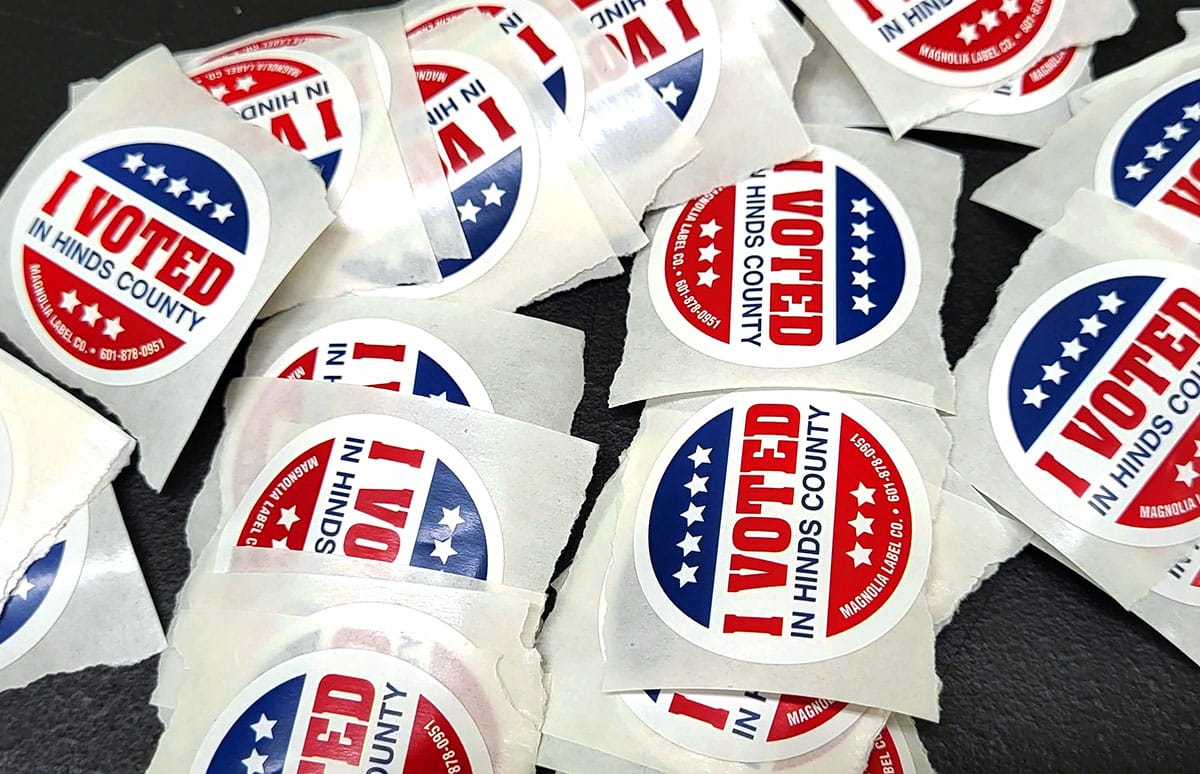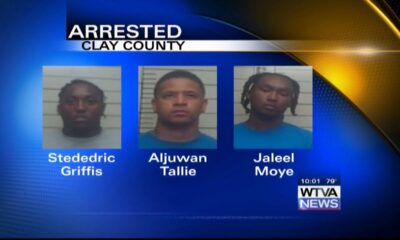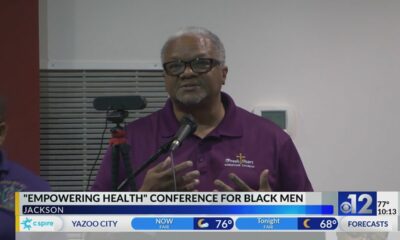Mississippi Today
With bipartisan majority, House passes bill to restore voting rights to people convicted of nonviolent crimes

A large majority of House members voted on Thursday to approve a plan that creates a process for people previously convicted of some nonviolent felony offenses to have their voting rights restored — the first of such a vote in Mississippi in more than a decade.
The House voted 96-11 to pass House Bill 1609, a bipartisan proposal to automatically restore suffrage to people convicted of nonviolent disenfranchising felonies after they've completed the terms of their sentence.
“It lets folks, five years after they've finished their sentence and satisfied all conditions, restore their rights … for folks that have cleaned their life up and gone straight,” House Speaker Jason White, R-West, told Mississippi Today. “It's not about rewarding that, but it's about recognizing it and placing them on that better path.”
Under the Mississippi Constitution, people convicted of any of 10 types of felonies lose their voting rights for life. Various opinions from the Mississippi Attorney General's Office expanded the list of disenfranchising felonies to 23.
White, the first-term speaker, tasked House Constitution Committee Chairman Price Wallace, R-Mendenhall, and House Judiciary B Chairman Kevin Horan, R-Grenada, with coming up with a feasible plan to restore suffrage to some people convicted of nonviolent felons.
The House measure would allow people convicted of nonviolent offenses such as bad check writing, perjury and theft to regain their suffrage if they have not been convicted of another felony for five years after completing their sentence and paying any outstanding fines.
But people convicted of murder, arson, armed robbery, carjacking, embezzling more than $5,000, rape, statutory rape, bribery, perjury, human trafficking and voter fraud would still lose their voting rights for life.
Rep. Kabir Karriem, D-Columbus, has filed legislation for years to restore voting rights to people convicted of felony offenses, but it never gained major traction at the Capitol. Karriem called the bill's passage a “historic moment” and thanked Republican leaders for working with him on the proposal.
“I think this bill restores hope as it makes its way through the process,” Karriem said. “It gives folks who have walked around with a scarlet letter on their chest for so long who have paid their debt to society a sense of hope.”
About 37,900 names are on the Secretary of State's voter disenfranchisement list as of Jan. 29. The list, provided to Mississippi Today through a public records request, goes back to 1992 for felony convictions in state court.
That number, however, may not be fully accurate because no state agency tracks people once they are struck for the voter rolls. Studies commissioned by civil rights organizations in 2018 estimated between 44,000 and 50,000 Mississippians were disenfranchised.
The practice of stripping voting rights away for life from people originated in the 1890 Constitution, when white supremacist leaders intentionally tried to disenfranchise Black Mississippians or keep them out of elected office. With a justice system fully on their side, the white leaders at the time chose to include crimes they believed Black people were more likely to commit.
Rep. Cheikh Taylor, D-Starkville, who is also the current chairman of the Mississippi Democratic Party, said that while the practice has racist roots, he believes the bill's passage debunks the notion that only Democrats and people of color are convicted felons.
“People suffer from these conditions in every village and hamlet in the state of Mississippi in all of our districts — and not just minority districts,” Taylor said.
The current process to have someone's suffrage restored is burdensome. It requires a lawmaker to introduce a bill on an individual's behalf, and two-thirds of lawmakers in both legislative chambers must agree. A person can also seek a gubernatorial pardon, though no executive pardon has been handed down since Gov. Haley Barbour's final days in office in 2011.
The bill now heads to the Republican-majority Senate, where it may receive a frosty reception. The 52-member Senate on Wednesday voted 29-23 to reject a separate bill that would restore Second Amendment rights to people previously convicted of nonviolent felony offenses.
Senate Bill 2626 did not address voting rights, but it could serve as a barometer for how the Capitol's upper chamber will address the House's suffrage restoration proposal.
Sen. Jeremy England, R-Vancleave, said he voted against the proposal because he didn't know enough information about the legislation, but he was open to reconsidering his vote.
“I'm sure even I have constituents who served their time … and would like to have this right restored,” England said.
Senators held the bill on a procedural motion, meaning they could debate the issue again at a later time and change their minds.
Senate Judiciary B Chairman Joey Fillingane, R-Sumrall, and Sen. Rod Hickman, D-Macon, told Mississippi Today that they plan on working with their colleagues to address their concerns and reiterate what the legislation aims to accomplish.
“I think some people just didn't understand what the bill was trying to actually do,” Fillingane said. “If you've completed the terms of your sentence, it was nonviolent, you haven't committed another crime for five years, then what's the problem?”
READ MORE: Lawmakers consider restoring suffrage, gun rights to those convicted of some nonviolent crimes
This article first appeared on Mississippi Today and is republished here under a Creative Commons license.
Did you miss our previous article…
https://www.biloxinewsevents.com/?p=338860
Mississippi Today
On this day in 1961
MAY 20, 1961

A white mob of more than 300, including Klansmen, attacked Freedom Riders at the Greyhound Bus Station in Montgomery, Alabama. Future Congressman John Lewis was among them.
“An angry mob came out of nowhere, hundreds of people, with bricks and balls, chains,” Lewis recalled.
After beating on the riders, the mob turned on reporters and then Justice Department official John Seigenthaler, who was beaten unconscious and left in the street after helping two riders.
“Then they turned on my colleagues and started beating us and beat us so severely, we were left bloodied and unconscious in the streets of Montgomery,” Lewis recalled.
As the mob headed his way, Freedom Rider James Zwerg said he asked for God to be with him, and “I felt absolutely surrounded by love. I knew that whether I lived or died, I was going to be OK.”
The mob beat him so badly that his suit was soaked in blood.
“There was nothing particularly heroic in what I did,” he said. “If you want to talk about heroism, consider the Black man who probably saved my life. This man in coveralls, just off of work, happened to walk by as my beating was going on and said ‘Stop beating that kid. If you want to beat someone, beat me.' And they did. He was still unconscious when I left the hospital.”
To quell the violence, Attorney General Robert Kennedy sent in 450 federal marshals.
This article first appeared on Mississippi Today and is republished here under a Creative Commons license.
Mississippi Today
Podcast: The controversial day that Robert Kennedy came to the University of Mississippi
Retired U.S. Bankruptcy Judge Edward Ellington talks with Mississippi Today's Bobby Harrison and Geoff Pender about former U.S. Attorney General Robert Kennedy's speech at the University of Mississippi less than four years after the riots that occurred after the integration of the school. Ellington, who at the time headed the Ole Miss Speaker's Bureau as a law school student, recalls the controversy leading up to the speech.
This article first appeared on Mississippi Today and is republished here under a Creative Commons license.
Mississippi Today
2024 Mississippi legislative session not good for private school voucher supporters
Despite a recent Mississippi Supreme Court ruling allowing $10 million in public money to be spent on private schools, 2024 has not been a good year for those supporting school vouchers.
School-choice supporters were hopeful during the 2024 legislative session, with new House Speaker Jason White at times indicating support for vouchers.
But the Legislature, which recently completed its session, did not pass any new voucher bills. In fact, it placed tighter restrictions on some of the limited laws the state has in place allowing public money to be spent on private schools.
Notably, the Legislature passed a bill that provides significantly more oversight of a program that provides a limited number of scholarships or vouchers for special-needs children to attend private schools.
Going forward, thanks to the new law, to receive the vouchers a parent must certify that their child will be attending a private school that offers the special needs educational services that will help the child. And the school must report information on the academic progress of the child receiving the funds.
Also, efforts to expand another state program that provides tax credits for the benefit of private schools was defeated. Legislation that would have expanded the tax credits offered by the Children's Promise Act from $8 million a year to $24 million to benefit private schools was defeated. Private schools are supposed to educate low income students and students with special needs to receive the benefit of the tax credits. The legislation expanding the Children's Promise Act was defeated after it was reported that no state agency knew how many students who fit into the categories of poverty and other specific needs were being educated in the schools receiving funds through the tax credits.
Interestingly, the Legislature did not expand the Children's Promise Act but also did not place more oversight on the private schools receiving the tax credit funds.
The bright spot for those supporting vouchers was the early May state Supreme Court ruling. But, in reality, the Supreme Court ruling was not as good for supporters of vouchers as it might appear on the surface.
The Supreme Court did not say in the ruling whether school vouchers are constitutional. Instead, the state's highest court ruled that the group that brought the lawsuit – Parents for Public Schools – did not have standing to pursue the legal action.
The Supreme Court justices did not give any indication that they were ready to say they were going to ignore the Mississippi Constitution's plain language that prohibits public funds from being provided “to any school that at the time of receiving such appropriation is not conducted as a free school.”
In addition to finding Parents for Public Schools did not have standing to bring the lawsuit, the court said another key reason for its ruling was the fact that the funds the private schools were receiving were federal, not state funds. The public funds at the center of the lawsuit were federal COVID-19 relief dollars.
Right or wrong, The court appeared to make a distinction between federal money and state general funds. And in reality, the circumstances are unique in that seldom does the state receive federal money with so few strings attached that it can be awarded to private schools.
The majority opinion written by Northern District Supreme Justice Robert Chamberlin and joined by six justices states, “These specific federal funds were never earmarked by either the federal government or the state for educational purposes, have not been commingled with state education funds, are not for educational purposes and therefore cannot be said to have harmed PPS (Parents for Public Schools) by taking finite government educational funding away from public schools.”
And Southern District Supreme Court Justice Dawn Beam, who joined the majority opinion, wrote separately “ to reiterate that we are not ruling on state funds but American Rescue Plan Act (ARPA) funds … The ARPA funds were given to the state to be used in four possible ways, three of which were directly related to the COVID -19 health emergency and one of which was to make necessary investments in water, sewer or broadband infrastructure.”
Granted, many public school advocates lamented the decision, pointing out that federal funds are indeed public or taxpayer money and those federal funds could have been used to help struggling public schools.
Two justices – James Kitchens and Leslie King, both of the Central District, agreed with that argument.
But, importantly, a decidedly conservative-leaning Mississippi Supreme Court stopped far short – at least for the time being – of circumventing state constitutional language that plainly states that public funds are not to go to private schools.
And a decidedly conservative Mississippi Legislature chose not to expand voucher programs during the 2024 session.
This article first appeared on Mississippi Today and is republished here under a Creative Commons license.
-
Our Mississippi Home7 days ago
Beat the Heat with Mississippi’s Best Waterparks
-
SuperTalk FM4 days ago
State auditor cracking down on Mississippians receiving unemployment benefits
-
Mississippi News Video6 days ago
Jackson has a gang problem
-
Local News3 days ago
Family files lawsuit after teen’s suicide in Harrison County Jail
-
Kaiser Health News7 days ago
Medicaid ‘Unwinding’ Decried as Biased Against Disabled People
-
Mississippi Today5 days ago
On this day in 1950
-
228Sports6 days ago
George County Pours Runs In 6A South State Title Victory At PRC
-
Local News Video6 days ago
In the Kitchen with J's Restaurant






































